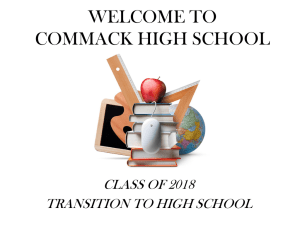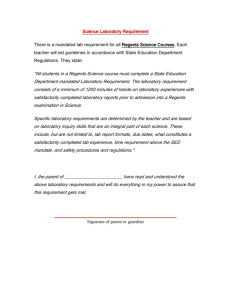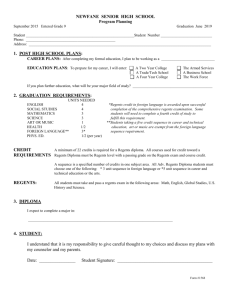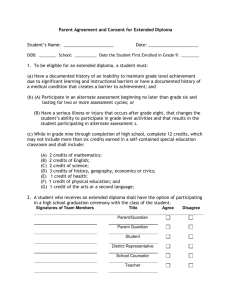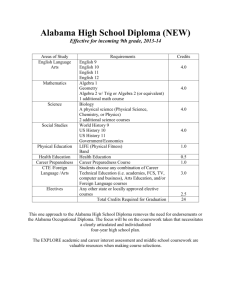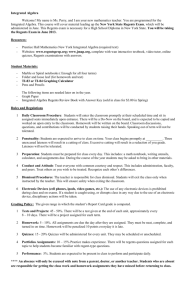9-12th Grade Course Booklet
advertisement
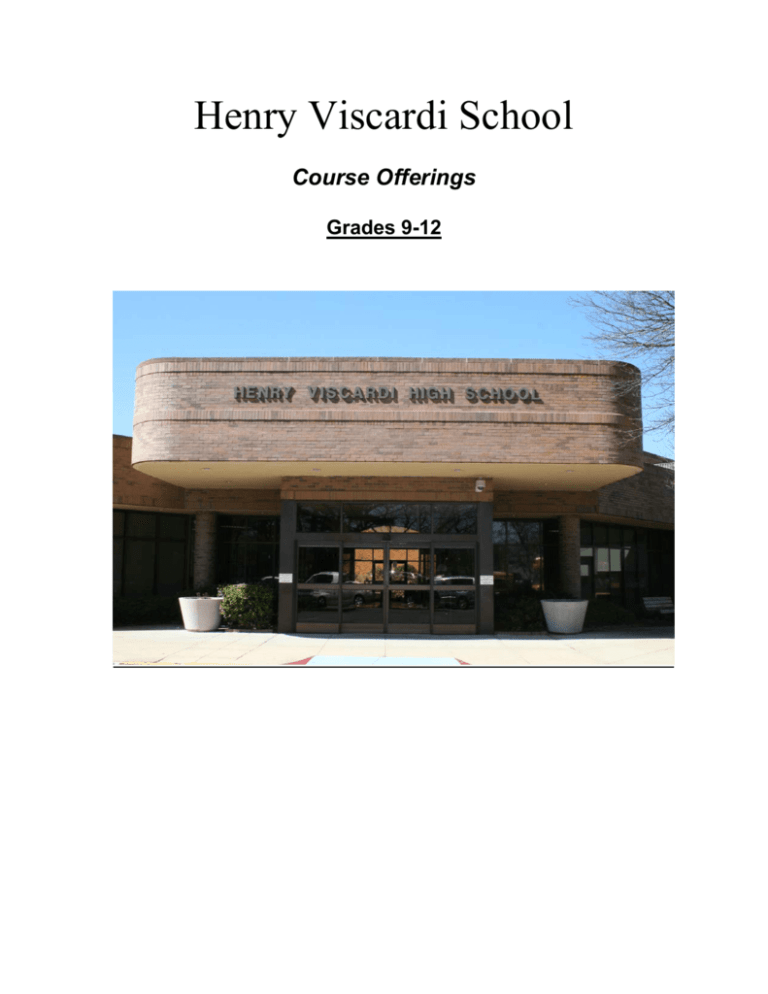
Henry Viscardi School Course Offerings Grades 9-12 MISSION STATEMENT The Henry Viscardi School is a teaching community of students, parents, teachers, staff, and volunteers dedicated to empowering students with physical disabilities and health impairments to enable them to be active, independent, self-sufficient participants in society. The Henry Viscardi School creates supportive and challenging learning environments and integrated community based services where all students are treated with dignity and respect. Beyond a traditional academic education, Viscardi offers and develops unique and innovative programs of excellence to address the scholastic, recreational, health, physical, vocational, and social needs of its students. The school shares its knowledge and skills to improve the education and lives of students with disabilities within their communities and throughout the world. HISTORY Founded in 1962 as the Human Resources School, the Henry Viscardi School provides quality education for students with physical disabilities. -1- HENRY VISCARDI SCHOOL STAFF DIRECTORY ADMINISTRATION Patrice McCarthy Kuntzler, Executive Director 465-1675 Jeanette Glover, Executive Associate, Transition and Pupil Personnel Services 465-1673 PSYCHOLOGY, GUIDANCE, SOCIAL WORK, MEDICAL, TRANSITION SERVICES Amanda Caccavo, Social Worker 465-1689 Dr. Ronald Friedman, Psychologist Dr. Joan Adickman, Psychologist 465-1687 Gail Nolan, Head Nurse 465-1650 -2- Advanced Regents Diploma Course Units English Language Arts Social Studies Math Science Foreign Language Physical Education Art and/or Music Health Electives Total Units 4 4 3 3 3 2 1 .5 1.5 22 credits Regents Exams English Social Studies Mathematics Science Language other than English 1 Regents exam (65 or higher) 2 Regents exams (65 or higher) 3* Regents exams (65 or higher) 2** Regents exams (65 or higher) 1 Regents exam (65 or higher) Mathematics: *Students must pass three commencement level Regents Examinations in mathematics through one of the following combinations: Mathematics A, Geometry, and Algebra 2/Trigonometry or Integrated Algebra, Geometry, and Algebra 2/Trigonometry. Science: **A total of two Regents Examinations in science, with at least one in life science and at least one in physical science. -3- Regents Diploma Course Units English Language Arts Social Studies Math Science Spanish Art/Music Health Physical Education Electives Total Units 4 4 3 3 1 1 .5 2 3.5 22 Required Examinations for Regents Diploma (passing score 65 or higher) Comprehensive English 1 Math Exam* Global History & Geography U.S. History & Government 1 Science Exam (Living Environment / Biology or Physical Setting / Earth Science) *New Math Curriculum –: For students entering 9th grade in September 2007 □ Integrated Algebra I –June 2008 □ Integrated Geometry –June 2009 □ Integrated Algebra II and Trigonometry –June 2010 • Students are required to have completed 2 units of Spanish by the end of 9th grade. • Students who are foreign language exempt on his/her IEP can be exempt from the Spanish requirement. • An integrated course in Math/Science/Technology may be used as the third required unit of credit in Math or Science. • A Regents diploma with “honors” or a Regents diploma with advanced designation with “honors” will be awarded to a student who has achieved an average of 90% in all Regents examinations. -4- Local Diploma Course Units English Language Arts Social Studies Math Science Spanish Art/Music Health Physical Education Electives Total Units 4 4 3 3 1 (unless exempt on IEP) 1 .5 2 3.5 22 Required Examinations Students must score a minimum of 55 on Regents Examinations or score 65 or higher on Regents Competency Tests for a Local diploma. Math Science Global History Studies U.S. History & Government Reading* Writing* *Both Reading and Writing RCT exams are required in place of the English Comprehensive Exam. -5- Individualized Education Program Diploma (IEP) The IEP Diploma is awarded to a student upon the successful achievement of the educational goals based upon the appropriate level of the New York State learning standards, and specified on the current IEP. While earning an IEP diploma is an important milestone for a student, it is a diploma that is often not accepted by employers or institutions of higher education. A student receiving an IEP Diploma remains eligible to receive a public school education until the student has earned a high school diploma or until the end of the year of such student’s 21st birthday, whichever is earlier (IDEA – Part 100.9 Regulations). An IEP diploma may be awarded to a student with a disability at the end of the school year in which a student turns age 21 upon finding that a student has achieved the educational goals based upon the appropriate level of learning standards established by the Commissioner, as specified in the student’s current IEP. Students seeking to obtain an IEP Diploma are required to sit for Regents / RCT exams in the courses they have completed unless assessment designation is “alternate assessment” on the IEP. Project R.A.M.P. Reaching All My Potential Prior to entering Project R.A.M.P. at Henry Viscardi School, students must have received 12 years of an appropriate level education and not completed the NYS requirements for a local or Regents diploma. • • • • Project Based Curriculum- Projects focus on increasing the students knowledge of his/her own community Pass/Fail Grading system in courses within the R.A.M.P. program Use of authentic materials (online and teacher created lessons and documents) Swimming in the Viscardi pool Field Trips- Trips into the community will be planned at least twice a month, both in the community around the school and when possible in the students own community. Business Projects- Students design, create and market various items throughout the year in an effort to help defray some of the cost of various trips and activities. -6- Individual Learning Needs • Students are exposed to the same curriculum/content addressing the NYS Standards; however individual learning styles and needs are met through adapting the curriculum/content as per the Individualized Educational Plan. • Identification of student’s learning style/needs will determine any adaptations to be made to the content/curriculum format. Possible Format Adaptations Rewrite with simplified language Reorganize Study Guides Books on CD Define and Illustrate words Incomplete Course / Failure Policy • Students must repeat a failed course if they do not have enough seat time/time in course due to unexcused absences. • Failed required courses must be repeated during the school year. • Students receiving a grade of “incomplete” in a required course must complete the course work during summer school or prior to the halfway point of the first marking period following the quarter in which the student received the incomplete grade. • Students failing a Regents/RCT must take the exam at the next available test date. Regents/RCT are offered in June, August, and January. -7- 9th Grade Viscardi Course Requirements Units Course English 9 Global History and Geography 9 1 1 (First year of a two year sequence) Integrated Algebra IA 1 (First year of a HVS two year sequence) Living Environment (Biology) Spanish 9 Career and Financial Management Adapted Physical Education Total 1 1 1 .5 6.5 units June Regents Living Environment 10th Grade Viscardi Course Requirements Units Course English 10 Global Studies 10 1 1 (Second year of a two year sequence) Integrated Algebra IB 1 (Second year of a HVS two year sequence) Physical Setting/Earth Science Health Adapted Physical Ed. Elective or Spanish (required for advanced regents diploma) Total June Regents Integrated Algebra I Global Studies Physical Setting/Earth Science -8- 1 .5 .5 1 6 units 11th Grade Viscardi Course Requirements Course Units English 11 American History and Government Algebra 2 and Trigonometry (or) Personal Finance/Basic Math Skills Environmental Science Adapted Physical Education Independent Living I Elective Total 1 1 1 1 .5 .5 1 6 units June Regents U.S. History and Government Comprehensive English Algebra 2 and Trigonometry 12th Grade Viscardi Course Requirements Units Course English 12 U.S. Government and Economics Adapted Physical Education Art Independent Living II Geometry or Math Elective Elective Elective 1 1 (.5 units each semester) .5 .5 .5 1 1 1 June Regents Geometry (for Advanced Regents Diploma) -9- ENGLISH LANGUAGE ARTS English Language Arts 9 1.0 credits This is a year long course that covers world literature including short stories, novels, poetry, and drama. In this course students will be exposed to a wide range of texts including Romeo and Juliet and the Miracle Worker. Students will be prepared for the difficult language in texts through vocabulary building exercises and instruction. Students will demonstrate their understanding through various written assignments including essays, journals, and short stories. Development of reading, writing, speaking and listening skills needed to pass 11th grade Regents: • Introduction to Research • Types of Poetry • Symbolism • Paraphrasing • Irony • Exposition 1.0 credits English Language Arts 10 This year long course is designed to enhance the skills learned in 9th grade reading, writing, speaking and listening. Some additional areas of focus are sensory imagery and strategies of persuasion. Students will read a wide range of Literature including John Steinbeck’s, “Of Mice and Men”, William Golding’s, “Lord of the Flies” and the Diary of Anne Frank. Students will be asked to analyze style, historical and cultural context as well as author technique. Writing focuses on improvement of paragraphing skills and advanced sentence structure. English Language Arts 11 1.0 credits This year long course is designed for a more thorough study of literature, including comparing film versus written version, debating and literary techniques and devices. Students will read a wide range of literature including, Arthur Miller’s “The Crucible” and Harper Lee’s “To Kill a Mockingbird”. Students will also produce essays and other writing in the biographical, descriptive, persuasive, expository, and literary analysis formats. Students will focus on the reading, writing and analytical skills necessary for successful communication. Students will focus on paraphrasing ideas from outside sources, and integrate quotations and citation into written text. Students will also receive SAT vocabulary training in preparation for entrance into college .-10- English 12 This course follows British and other world literature from the Middle Ages through the present time. The selections include “The Iliad”, “Macbeth” and “Catcher in the Rye” as well as autobiographies and an optional screenplay/video project. Students will be prepared for language arts skills at a college level, speak and listen effectively in large and small groups and continue to develop writing and critical thinking skills. Developing research skills and improving time management skills are areas also covered in this course Creative Writing (Grades 10, 11, and 12) . 5 credits In this course, students will be encouraged to express themselves through writing. Poems, memoirs, narratives, stories, or even song lyrics may be selected by students. Students will write because they want to write and create their own writing portfolio. They will also learn many skills associated with writing, such as work and time management techniques that will help them during their college years and beyond. Course Objectives: ♦ To generate ideas through brainstorming; ♦ To heighten sensory awareness; ♦ To master writing techniques in prose and verse; ♦ To refine writing process and word usage skills found in college and work world; ♦ To develop analytical, interpretive, and critical thinking skills. -11- MATHEMATICS (9th Grade) 1.0 credits Integrated Algebra 1A This is a year long course that contains units in the study of: the language of algebra, real numbers, solving linear equations, graphing relations and functions, analyzing and solving linear equations, and solving systems of linear equations and inequalities. This is the first half of a two-year program preparing students for the Integrated Algebra Regents. The use of graphing calculators (TI83+ and/or TI84+) is an integral part of this course. This course meets the NY State Learning Standards and can be modified to meet each child’s learning needs. Integrated Algebra 1B (10th Grade) 1.0 credits Prerequisite: completion of Integrated Algebra 1 This is the second half of a two-year program that fulfills the math requirement for a Regents diploma. Topics include factoring, quadratic and exponential function, radical and rational functions, rational expressions and equations, statistics, and probability. The use of a graphing calculator is included in this course. At the conclusion of this course, the student will take the Integrated Algebra Regents test. Algebra 2 and Trigonometry/with Lab - (11th Grade) Curriculum as outlined by the New York State Education Department standards. Topics of study include: imaginary and complex numbers; polynomial, radical, trigonometric, exponential and logarithmic functions; direct and indirect variation; investigations of circular functions; and trigonometric equations and identities. At the conclusion of the course there will be a Regents exam. Geometry /with Lab (12th Grade) 1.0 credits This is the third Regents course to fulfill the math requirement for a Regents diploma with advanced designation It contains units in the study of: lines and angles, logic, triangles, coordinate geometry, trigonometry, geometry transformations, quadrilaterals and circles, and area and volume. The use of graphing calculators (TI83+ and/or TI84+) is an integral part of this course. This class prepares students to take the NYS Geometry Regents examination. -12- Personal Finances (Grades 11 -12) 1.0 Credits This course is designed to prepare students to manage their personal finances. Students will learn fundamental money management skills, including calculating gross income, net income, paying taxes, recordkeeping, establishing savings accounts, handling credit, housing costs, and investing. These math skills, applications, and concepts will help students make a successful transition to the adult workplace. Business Math (Grades 11-12) 1.0 Credits This course covers topics that one finds in the business world. Topics include a study of Personnel, Production, Purchasing and Sales. The TI-30 calculator is used in this course Math for Living on Your Own (Grade 11) 1.0 credits This non- Regents course is designed for the teaching of everyday math skills. The students will build on math skills they have learned in previous years as well as explore and research new concepts. These concepts will exemplify real-world application. Students will be evaluated on participation, tests, reports, oral presentations, and group activities. Topics include using street maps, bus and train schedules, checking accounts, classified ads, budgets, credit cards, home improvement, adjusting recipes restaurant dining and tips. Basic Skills Math (Grades 11-12) 1.0 credits This non-regents course is designed to teach basic math skills to high school students. Topics include set of integers, aspects of algebra, rational numbers, graphing, measurement of geometric figures, ratio, proportion and percent, probability and statistics and consumer and job related mathematics. This course prepares the student for the Math RCT. -13- SCIENCE Biology / Living Environment (9TH Grade) 1.0 credits This year long course covers the following topics: similarities and differences among living organisms; homeostasis in organisms; genetic community; reproduction and development; evolution, ecology; human impact on ecosystems. Students will use scientific inquiry and skills to complete 1200 minutes of laboratory experience. Students will prepare to take the New York State Regents in Biology. Physical Setting / Earth Science (10th Grade) 1.0 credits This year long course studies our planet, its changing systems, and its setting in the universe. Scientific literacy, scientific principles, and scientific inquiry are developed. Instruction focuses on student understanding and demonstration of important relationships, processes, mechanisms, and application of concepts, especially application skills related to real-world situations. A laboratory requirement of successfully completed 1200 minutes of laboratory experience is required, and then followed by a New York State Regents examination. Environmental Science (11th Grade) 1.0 credits This year long course is a required course for the eleventh grade. The course covers the following topics: studying earth, ecological interactions, biomes, people in the global ecosystem, energy resources, resources in the biosphere and managing human impact. Students will use scientific inquiry and skills to complete weekly laboratory experiences. Students will research and evaluate viewpoints to develop their own opinions on environmental issues. New developments in the field and successful efforts to balance Earth’s biodiversity are explored. Students will receive one credit of the three required in Science for a high school diploma. -14- SOCIAL STUDIES Global History & Geography (9th Grade) 1.0 credits This is the first year of a two-year course. In this year long course students will use a variety of intellectual skills to demonstrate their understanding of major ideas, eras, themes, developments, and turning points in global history and examine the broad sweep of history from a variety of perspectives. Students will encounter the following topics: Ancient Civilization of Africa, Asia, India, China, Greece, Rome and the Americas. Content will also focus on various religions such as: Christianity, Judaism, Islam, Buddhism, Hinduism, and Daoism. The rise of Europe, the Middle Ages, the Byzantine Empire, Renaissance and Reformation, first Global Age, and the Age of Absolutism will also be studied in this course. The Regents exam is given at the end of the tenth grade. Global History & Geography (10th Grade) 1.0 credits This year long course covers the earliest human societies to present day problems and issues. Included in these topics are important civilizations, major belief systems, turning points in history, forms of government, types of economic systems, major revolutions and uprisings. Students will be asked to demonstrate their understanding of the geography of an interdependent world. This is the second course in a two-year sequence of Global History & Geography starting in 9th grade. This course covers all necessary topics to meet the 10th grade Social Studies standards set by New York State and prepares the student to sit for the Global History & Geography Regents. Time is set aside at the end of the course to review 9th grade content as well. United States History and Government (11th Grade) 1.0 credits This year long course covers the time when people first settled the lands that would be called the Americas in the 1500’s, through the American Revolution and the struggle for independence; all wars fought defending the United States and U.S. involvement in defending other countries. Students will study the foreign and domestic policies of a number of early U.S. Presidents and every President from Franklin D. Roosevelt to George W. Bush. Landmark Supreme Court cases will be reviewed, and all corresponding constitutional amendments discussed. -15- Students will also be asked to demonstrate their understanding of the U.S. geography and the interdependent world in which we live in. This course covers all necessary topics to meet the 11th grade Social Studies standards set by New York State and prepares the students to sit for the United States and Government Regents. Economics (12th Grade) .5 Credits Students will use a variety of intellectual skills to demonstrate their understanding of how the United States and other societies develop economic systems and associated institutions to allocate scarce resources, how major decision-making units function in the United States and other national economies, and how an economy solves the scarcity problem through market and non-market mechanisms. U.S. Government (12th Grade) .5 credits Students will use a variety of intellectual skills to demonstrate their understanding of the necessity for establishing governments; the governmental system of the United States and other nations; the United States Constitution; the basic civic values of American constitutional democracy; and the roles, rights, and responsibilities of citizenship, including avenues of participation. Current/Social Issues (Grades 10, 11, 12, RAMP) .5 credits The objective of this course is to encourage students to examine current issues in American society and focus on developing independent opinions. Through a number of media outlets (internet, TV, newspaper, and radio), students will research contemporary social issues and public polices which will enable them to develop a better understanding of today’s issues. Grading will be based on weekly/bi-weekly summaries and personal reactions on assigned or chosen topics. The final exam will include a PowerPoint presentation detailing a societal issue. The PowerPoint should include both text and photos expressing student’s opinion and/or the opinion of experts with whom the student agrees or disagrees. -16- SPANISH Spanish 9 1.0 credits This year-long course begins with a review of Spanish pronunciation, vocabulary, and grammar. It builds on previously acquired knowledge. Instruction focuses on further development of the four basic communication skills: listening, speaking, reading, and writing, as well as the cultural understanding skills. Collaborative activities include dialogues, skits, and research projects. Students will learn new vocabulary and expressions, more complex language structures, as well as the present, imperfect, future, and command verb tenses. This course advances the study of customs, culture, history, and geography of Spanish-speaking countries. It continues to emphasize the contributions of Spanish-speaking people and communities around the world. Spanish 10 1.0 credits This is a one year course where students enrolled in this course are taking it as part of a 3-year sequence that will culminate in taking the Comprehensive Spanish Regents examination at the end of the 11th grade. The curriculum for the year will focus on more difficult grammatical concepts, such as additional tense formation for both regular and irregular verbs. There will also be a great concentration on vocabulary building that when used in conjunction with other grammar, will lead to the development of well-organized paragraphs that will form compositions. Students will also work on strengthening speaking, listening, and reading skills. Spanish 11 1.0 credits This year long course will focus on mastering the speaking, listening, reading, and writing components of a second language. Equal emphasis will be placed on those components. Materials will include the use of a textbook, a workbook that focuses primarily on grammar, listening exercises to enhance auditory skills, extensive reading comprehension passages to decipher, and increased writing skills that show a mastery of grammatical concepts. -17- Spanish for Travelers (11, 12, RAMP) .5 Credits Students will immerse themselves in the sights and sounds of Spanish culture. This cultural awareness will develop through the use of authentic materials, literature, and other resources. Emphasis will also be placed on the development of effective listening skills and better oral comprehension. Students will share conversations in Spanish that will develop vocabulary used in common traveling scenarios and daily conversation. Business Career and Financial Management (9th -12th) 1.0 credits This year long course will provide students with basic knowledge about the realities of the working world. It is designed to help students to develop transferable skills essential to all occupations and to explore various occupational areas. Students will be provided with the opportunity to learn about the features of our economy, begin a self-assessment, and learn the skills and competencies needed for success in the workplace. Students will apply academic skills to solve work-related problems and become familiar with skills that are needed to become successful citizens, employers, and employees. In addition, students will explore a variety of careers and evaluate their suitability for that career based upon an investigation of their own goals, interests, and abilities. Microsoft Office 9th – 12th 1.0 credits This year long course provides students with hands-on experience which will result in the familiarity with Microsoft Office. Students will be working with Word, Excel, Access, and Publisher. The interrelationship between software programs will be emphasized. Keyboarding 9th – 12th .5 credits This is a one semester course is individualized and designed to familiarize students with proper finger techniques for touch-keyboarding. Students will use word processing programs to prepare personal and business correspondence including centering exercises, business letters, memorandums, reports, tabulations, and enumerations. Students will have the opportunity to increase his/her speed and accuracy throughout the course. -18- Desktop Publishing 9th – 12th .5 credits Students in this one semester course will learn to combine text with pictures, charts, and graphics to produce professional quality document such as business cards, letterhead, brochures, advertisements, etc. Students will use Microsoft Publisher and Word to experience the exciting possibilities of electronic publishing. Accounting 1 1.0 credits This year long course provides students with an overview of the complete accounting cycle. Students will process transactions through the entire accounting cycle for a service and merchandising business. Topics covered include: the fundamentals of analyzing and recording business transactions, the use of source documents, pasting to ledgers, preparation of year-end financial statements, banking procedures, payroll entries, and other employment related topics. Students will be introduced to automated accounting using computers to process transactions. HEALTH Health .5 credit This one semester course is designed to provide our students with the knowledge of what constitutes physical, mental/emotional and social wellness and to learn how to balance these components effectively. We believe that the practice of healthful living will affect students in all areas of learning; therefore, it is our desire to assist students in the development of health enhancing lifestyles reflecting positive attitudes and behaviors. As part of the Health Education course, students will be responsible for learning and implementing personal and social health skills (tools) that include self-management, relationship management, stress management, planning and goal setting, decision-making, communication, and advocacy. Topics covered include, but are not limited to building health skills and character, being a health literate consumer, achieving good mental health, nutrition, and physical activity, violence prevention, sexuality education, communicable diseases including STDs and HIV/AIDS, and alcohol, tobacco, and other drug use. -19- PHYSICAL EDUCATION Adapted Physical Education .5 credits Students will develop the necessary knowledge and skills to establish and maintain physical fitness, participate in physical activities and maintain personal health. This is accomplished through team sports, outdoor activities and leisure activities. The team sports consist of baseball, football, hockey, and basketball. The personal living skills that are developed through team sport activities are as follows: cardiovascular fitness, musculoskeletal fitness, cooperation, risk-taking, safety, initiative, leadership, trust and respect. Additional activities include outdoor track, weight training, leisure activities (chess, checkers and board games) and adaptive gymnastics (simple stunts, tumbling, and small apparatus). TECHNOLOGY EDUCATION .5 credits Photoshop Image Editing / Photography Learn the fundamentals of Photoshop to perform many different image editing techniques. In this course, students will learn how to use several tools for selecting parts of images, use layers, layer effects, filters, painting and blending techniques, and perform photo corrections, repairing and photo restoration . 1 semester course Software: Adobe Photoshop CS3 Web Design .5 credits This course allows the student to become the author, art director and editor of their own multimedia web site including sound, video, graphics and text. Critical and creative thinking will be emphasized during the process of creating the web site. This course will conclude with each student having a fully functioning web site. Prerequisite: Image Editing/Photography (Photoshop CS3) Media Arts-Video Production 1.0 credits This class will challenge students to practice time management of complex involved tasks to successfully meet deadlines for the production of a video. Visual literacy(using images to tell a story) and Technical literacy(mastering the software and equipment) will be addressed as students complete the tasks of writing a script in English class, storyboard -20- the shots for filming, cast, act and use a digital video camera to film the scenes in Digital Media Technology. The final post production will involve synthesizing all they have learned to edit the footage into its final format in Adobe Premiere Advertising Agency .5 credits This course will give students real life design experiences through the application and integration of graphic design skills previously learned. Video, web, animation and image editing skills will be used to create multimedia projects. This course will emphasize vocational training by providing an environment where complying with deadlines and collaboration with clients will be necessary. INDEPENDENT LIVING Independent Living I (11th grade) .5 credits This half year course is designed to prepare students for post-high school experiences. Topics include budgeting, personal management, housing, employment, college expectations, disability awareness, values, leisure activities, advocacy, parenting, transportation and mobility, attendant care, and health related areas. The course work includes use of materials from community agencies, guest speakers, application papers, computer materials, textbooks and field trips. Independent Living II (12th grade) .5 credits This is a continuation of Independent Living I. In this half year course students will continued to be prepared for post-high school experiences. Topics include college expectations, disability awareness, advocacy, health issues, personal management, and child development project. The course work includes use of materials from community agencies, guest speakers, application papers, computer materials, textbooks and field trips. -21-

